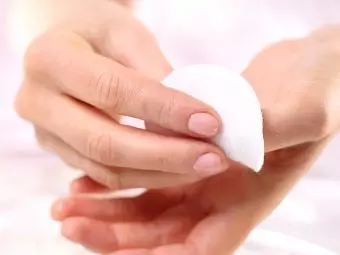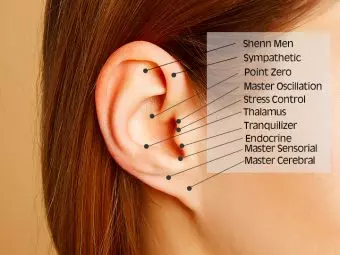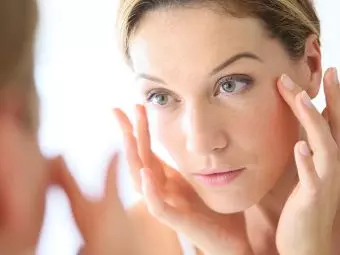Wondering why your hair stopped growing? You notice that your hair has started to thin, and you have lost volume. Although this happens with age, it could also point to a serious underlying medical condition. It is important to understand the different causes of hair loss to ensure timely treatment. Poor lifestyle choices, pollution, stress, and an imbalanced diet are the major reasons your hair stops growing. Read this post to understand the changes your need to make to get healthy tresses.
In This Article
How Much Does Hair Grow In A Year?
Every person’s hair is genetically programmed to stop growing after reaching a particular length, after which it goes through the catagen, telogen, and exogen phases before growing again (1).
An average person’s hair grows at a rate of 6 inches per year, and usually, the anagen phase (growth phase) lasts between 2-6 years. However, different people have different hair growth cycles that are affected by many factors that we will discuss next.
Why Won’t My Hair Grow?
Your hair follicles go through a growth cycle that has four phases: 1. Anagen phase (growing phase) 2. Catagen phase (transition phase) 3. Telogen phase (resting phase) and 4. Exogen phase (hair shedding phase).
Each hair follicle goes through this cycle, which determines the length and volume of a person’s tresses. If this cycle is disrupted due to any factor, normal hair growth is affected. Following are the most common reasons your hair stops growing:
1. Genetics
Did you know that the length, color, volume, and strength of your locks is governed by your genes? Yes, genes play a significant role in influencing your hair growth cycle (2).
If you have long, healthy, lustrous, and thick hair despite not taking much care of it, thank your genes. Otherwise, you need to put in extra effort to stop your hair from thinning and enhance its growth.
2. Stress Level
It is medically proven that any kind of physical or psychological stress is detrimental to hair growth (3). Stress triggers a condition called Telogen effluvium in which your hair enters the telogen phase (resting phase) prematurely, thus restricting 30% of its growth completely (4). Though this condition does not require any medical treatment and lasts no longer than six months, it does affect your hair growth cycle and cause hair loss.
3. Age
Aging not only causes your hair to gray but also affects its growth because the anagen phase is known to get shorter as you grow older (5). Also, your physical health and food habits – besides the lifetime of experiments with styling, processing, dyeing, bleaching, and treating your hair – affect your hair growth cycle (6).
4. Hair Breakage
Normally, an average person’s hair grows at a rate of about 6 inches per year. If you observe that your hair is the same length even after a certain period, it might actually be breaking (2).
Hair breakage can be caused by both inadequate or excessive care. Overprocessing and heat styling your hair excessively may result in the loss of moisture and elasticity, causing it to become dry and brittle and leading to breakage.
5. Split Ends
People with dry hair usually get split ends. If your hair does not receive enough nutrients to balance the moisture levels, its ends will start splitting, resulting in breakage. You cannot undo split ends, and the only way to stop them from causing further hair breakage is to cut them off. You must take adequate care of your hair to avoid split ends and breakage.
6. Hairstyles And Styling Products
The chemical treatments, products, and processes used to style your hair have a big impact on its health and growth (2). The build-up of oils and products on your scalp can block the follicles and impede hair growth.
Complicated hairstyles that involve a lot of combing, pulling your hair tight, and the use of serums can also lead to hair damage. Excessive styling and use of chemical products will not only stop your hair growth but also cause scalp diseases that can lead to permanent hair loss.
7. Alopecia Areata
Alopecia areata is an autoimmune disorder in which the immune system harms the cells in your hair follicles and causes your hair to fall out in patches (7).
Scientists believe that this condition might be genetically inherited, and people diagnosed with hay fever, vitiligo, Down syndrome, pernicious anemia, asthma, and thyroid issues have a higher risk of developing it. However, proper medication and phototherapy can treat this condition.
8. Lack Of Exercise And Healthy Diet
We are sure you have heard of the phrase, “You are what you eat.” A healthy diet and exercise routine are very important for hair growth. Just like your body, your hair also requires adequate vitamins, minerals, and nutrients to grow (8).
In fact, doctors suggest people take certain multivitamins in addition to a healthy diet to boost hair growth. Deficiencies of iron, protein, zinc, vitamin A, or biotin can weaken your hair, subjecting it to damage and loss.
However, if you take adequate intake of vitamins, minerals, and nutrients to nourish your hair follicles and strengthen your tresses, you can prevent hair loss and promote healthy hair growth. Also, keeping your mind as healthy as your body does great wonders for your hair.
9. Dry Hair And Scalp
Dry scalp and brittle tresses are signs of unhealthy hair. Lack of moisture or imbalance in the moisture levels of your scalp makes your hair dry, leading to breakage and restricting its growth.
Prolonged dryness of your scalp also leads to the development of infections that cause patchy hair loss. Therefore, you need to moisturize your hair with natural products and methods to promote healthy hair growth.
10. Thyroid Problems
Irregularities in the production of hormones by the thyroid gland can also have a negative impact on your hair (9). Both hypothyroidism and hyperthyroidism can affect hair growth as they affect your body’s functionality and metabolism, thereby causing hair thinning and hair fall.
Subscribe
11. Childbirth And Breastfeeding
Hormonal imbalances after childbirth often result in what is known as postpartum hair loss (10). A healthy diet, regular exercise, and intake of additional nutritional supplements are necessary to minimize postpartum hair loss.
12. Poor Hair Care Regimen
An improper hair care regimen can have a major negative impact on your hair growth (2). Excessive styling, inadequate washing and conditioning, use of chemical products, inefficient hair care tools, and hair damaging accessories indicate a substandard hair care routine, which needs to be changed as soon as possible if you want thick, long, and healthy hair.
What Can Be Done If Your Hair Is Not Growing?
When you realize your hair is not growing anymore, it’s time to take proper care of it to minimize hair loss and damage. Once you figure out the reason for your reduced hair growth, you can try out various ways to prevent excess hair fall.
A proper hair care routine, adequate diet, and regular exercises to keep your body and mind healthy, following the prescribed medication for the treatment of complicated health issues, avoiding over styling your hair, and replacing chemical products with natural and environment-friendly ones are some ways to maintain healthy hair and protect it from further damage and loss.
On average, your hair grows 6 inches every year. Due to disruption of the hair growth cycle, your hair may stop growing. Multiple factors such as genetics, stress, age, poor diet, or aggressive hair styling can lead to hair loss. It may also be a sign of an underlying medical condition. A balanced diet, physical exercise, and a proper hair care routine can protect your hair from further damage. However, if you continue experiencing severe hair fall, consult your doctor for proper diagnosis and further treatment.
Sources
Articles on StyleCraze are backed by verified information from peer-reviewed and academic research papers, reputed organizations, research institutions, and medical associations to ensure accuracy and relevance. Check out our editorial policy for further details.
- Advances In Understanding Hair Growth, f1000 Research, US National Library Of Medicine, National Institutes of Health.
https://www.ncbi.nlm.nih.gov/pmc/articles/PMC4755418/ - The Genetics Of human hair Growth, Birth Defects Original Article Series, US National Library Of Medicine, National Institutes of Health.
https://www.ncbi.nlm.nih.gov/pubmed/5173315 - Stress And Hair Growth Cycle: Cortisol-Induced Hair Growth Disruption, Journal of Drugs in Dermatology.
https://jddonline.com/articles/dermatology/S1545961616P1001X - Burden Of Hair Loss: Stress And The Underestimated Psychological Impact Of Telogen Effluvium And Androgenetic Alopecia, Journal Of Investigative Dermatology.
https://www.jidonline.org/article/S0022-202X(15)30963-5/fulltext - A Comment On The Science Of Hair Aging, International Journal Of Trichology, US National Library Of Medicine, National Institutes of Health.
https://www.ncbi.nlm.nih.gov/pmc/articles/PMC6369639/ - What Ages Hair, International Journal Of Women’s Dermatology, US National Library Of Medicine, National Institutes of Health.
https://www.ncbi.nlm.nih.gov/pmc/articles/PMC5419032/ - Alopecia Areata, Nature Reviews, Disease Primers. US National Library Of Medicine, National Institutes of Health.
https://www.ncbi.nlm.nih.gov/pmc/articles/PMC5573125/ - Diet And Hair Loss: Effects of Nutrient Deficiency And Supplement Use, Dermatology Practical And Conceptual, US National Library Of Medicine, National Institutes of Health.
https://www.ncbi.nlm.nih.gov/pmc/articles/PMC5315033/ - Thyroid Hormone Signaling Controls Hair Follicle Stem Cell Function, Molecular Biology Of The Cell, US National Library Of Medicine, National Institutes of Health.
https://www.ncbi.nlm.nih.gov/pmc/articles/PMC4454174/ - The Changes In The Hair Cycle During Gestation And The Post Partum Period, Journal Of The European Academy Of Dermatology And Venereology, Us National Library Of Medicine, National Institutes of Health.
https://www.ncbi.nlm.nih.gov/pubmed/23682615
Related
The following two tabs change content below.
- Author
Anjali Sayee
Anjali specializes in hairstyles and hair and skin care and has written over 200 articles in these domains. Her philosophy… more



 How To Take Care Of A New Tattoo And Safety Precautions
How To Take Care Of A New Tattoo And Safety Precautions I Slept With An Onion In My Sock And This Is What Happened
I Slept With An Onion In My Sock And This Is What Happened 6 Brilliant DIY Ideas For Nail Polish Removers
6 Brilliant DIY Ideas For Nail Polish Removers Acupressure Points On Ears: What Are They And Do They Work?
Acupressure Points On Ears: What Are They And Do They Work? 8 Best Ways To Increase Oxygen Levels In Blood
8 Best Ways To Increase Oxygen Levels In Blood 20 Most Beautiful Flowers That Are Commonly Available In India
20 Most Beautiful Flowers That Are Commonly Available In India Top 5 Online Beauty Products Sites For Shopping In India
Top 5 Online Beauty Products Sites For Shopping In India Top 19 Bindi Designs For You To Try
Top 19 Bindi Designs For You To Try 11 Things You Should Never Put On Your Face
11 Things You Should Never Put On Your Face